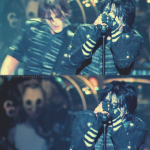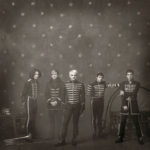Here was an ambitious concept record that mixed piano ballads, vaudeville and knuckle-cracking punk/pop that attracted an older audience, while still holding their teen fanbase in thrall. The result was that The Black Parade sold well over three million, making MCR one of the hottest US rock acts around.
Yet the album quickly became an albatross, a burden exacerbated by tabloid outrage, which in 2008 linked the band to a self-harming cult among their teenage fans. “ The Black Parade ,” explains Way – who, sitting cosily in a sofa chair, expresses himself via a gentle and sincere flow of words – “was a burden emotionally and physically, as well as culturally being a heavy weight. But then I learnt to love it again, which came down to playing the shows, and seeing the responses to it.
“The process of re-engagement with the album began with honestly sitting down and doing media interviews like this, and also just talking to people about it. When we were touring it for over two years, we didn’t realise what it meant to people. We had no perception of it because we didn’t look for it. All we felt was the negative cultural impact – not bad reviews of shows or albums, but rather the tabloidism that went around.”
““The perception about The Black Parade was that it was a full-frontal-assault-with- guns-blazing album, but it took us almost three years to sell three million records. That gradual process is how it should be, because it gives people time to digest, understand and appreciate. I know a lot of the ‘full-frontal’ kind of records – they come out, everybody goes wow, everyone wants to like them straight away, yet within a few months they get bored with them; within a year or so, they don’t talk about them at all. A challenging record is one that people have to think about, and that will last longer.”
“The Black Parade thanks you for all of your gifts! Including the socks!”
– 2/28/07, Detroit
“I’m sure you all have seen in the tabloids calling us some emo death cult. But I’m sure you know that we have never encouraged you to be anything than your fucking selves, and to never take any one else’s mother-fucking shit!”
– 2/28/07, Detroit
“The Black Parade is DEAD!”
– 3/13/07, San Diego, CA
“The Black Parade went home… back to Italy!”
– 3/15/2007 Oakland, CA
“Although technically, the Black Parade, are from ITALY.”
– Manchester 3/24/07
“We are Le Black Parade. Let me hear you say it. (fans say it). Le Black Parade – it’s French. Get with it. It’s new. It’s fashionable. Get with it – It’s French.”
– Tampa 4/19/07
“The Black Parade has to go home soon, so you’re gonna be stuck with My Chemical Romance. I’m sorry. That singer has a despicable mouth, he dresses funny, and he can’t sing!”
– Ft. Lauderdale, FL 4/22/07
“Okay, we’re gonna play two more songs for you, then the Black Parade is going to get in their black sedan…and go home. Back to Italy. My Chemical Romance is coming on after this. But personally I think their music isn’t that great and they have horrible taste in clothing.”
– Atlanta, GA 4/24/07
“The Black Parade’s only got two songs left, but next up is My Chemical Romance. If you’re asking me, which you aren’t, but anyhow, I think they’re horrible dressers. And their language is atrocious.”
– Columbia, MD 4/27/07
“My Chemical Romance are from New Jersey, Thursday are from New Jersey, but the Black Parade are from Italy. Just so you know.”
“We are the Black Parade! Coming up next is My Chemical Romance…if you’re into that kinda shit!”
– show in Hartford CT 2007
This Is How The Story Ends.: My Chemical Romance and the Death of Emo – MSN Interview
The article began its incendiary report rather matter-of-factly: “A girl of 13 killed herself after becoming obsessed with a fashion which links death with glamour, an inquest heard. Hannah Bond hanged herself from her bunk bed with a tie after becoming an ‘Emo.’”
The date was May 9, 2008 and the British paper the “Daily Mail” was reporting on the sudden suicide of a teenage girl after her parents wouldn’t let her sleep over at a friend’s house. Though her musical tastes were certainly put into question by the coroner, with its next sentence the paper would set off a firestorm of controversy and anger whose ripples can still be felt today: “Emo fans wear dark clothes,” it read. “Practise self-harm and listen to ‘suicide cult’ rock bands.”
And there it was, an assumption by a journalist aiming to drum up publicity with little to no proof. The article went on to name only one band in its attack on ‘Emo.’
“One of the foremost of these “suicide cult” bands is My Chemical Romance, from New Jersey,” the last paragraph begins before describing the success the band’s concept album, ‘The Black Parade,’ had attained in the UK. It concludes with a final, ignorant interpretation of the concept: “The Black Parade is a nickname for the place where Emo fans believe they will go when they die.”
With that the members of My Chemical Romance — a band at the height of their fame whose message, especially on that album, their biggest commercial success to date, was of positivity in the face of death — affectively became the target for thousands of frustrated mothers looking for someone or something to blame. The fallout was epic.
“I thought if we made an album that tried to change the world, or give it hope, it would really happen,” lead singer Gerard Way recently told Spin Magazine. “But all people found was death and destruction and misery and self-hate. I learned the world doesn’t want to be saved, and it will f—cking punch you in the face if you try.”
It was with this mentality — emotionally broken, artistically strained — and at the height of their popularity, that the band began getting work on a follow up. With its lead singer and songwriter’s guilt weighing heavily on its shoulders, My Chemical Romance set out to create “the polar opposite of the Black Parade” and, in turn, release itself from the dreaded tag that hung like a noose tightly around their necks.
Given the aftermath of Black Parade, is there anything you wish you’d done differently?
Gerard: The only thing I wish I’d done differently was paying attention at all to the reaction to the album. I beat myself up about doing that, but it was really hard to ignore.
Frank: That’s the thing, when it’s in your face every day and people are telling you about it and asking if you feel responsible. It’s like, fuck, man. You’ve got me in a cage and you’re just poking me with a stick at that point. And no, I don’t feel responsible, it’s not my responsibility. But it’s hard when that’s all you see. You’re in the bus, in a venue, in the bus, in a venue, in a bus, in a venue and that’s what people are telling you is going on, and damning you for it. When really all you’ve done is travelled to the next city and performed. That’s all you’ve done. And people are telling you that millions of miles away some kid got beat up for loving your band. That’s fucked up.
Gerard: That happened a lot. I remember getting to Australia, turning on the TV and they were talking about kids at Big Day Out getting beat up and it’s like, what the fuck, man.
I think it’s a different thing this time, though. I don’t expect to turn on the TV and see much of that. Not that I’d care this time. I can’t in order to keep doing it. I can’t care about that any more. Like, the aftermath really has to be a secondary thing that I can’t give a shit about. I think that’s kept the art pure, I think that’s why it’s so vibrant and fuck you and awesome and fearless, and the music sounds just like it looks, and the visual promises you so much danger and excitement, and the record delivers that. I think that doesn’t happen very often.
But to put the bad stuff in perspective, you just have to Google ‘My Chemical Romance saved my life’…
Gerard: Yeah I know! But that’s a hard thing too. Because well… Frank, the way he puts it about them: they did that, not us.
Frank: They don’t give themselves enough credit. I think it’s great to inspire that, and to be the record that helps you get through something, but that’s all it is. It helps you to do that; you’re the one who actually did it. Our kids are really strong. They like to give us the accolades, but in fact it really is them. They’re the heroes.
On The Black Parade he dubbed himself “the savior of the broken, the beaten, and the damned,” and he established for the band the modest goal of rescuing the world. “I thought if we made an album that tried to change the world, or give it hope, it would really happen,” Way says, cheerfully. “But all people found was death and destruction and misery and self-hate. I learned that the world doesn’t want to be saved, and it will fucking punch you in the face if you try.”
…
You’re no one’s savior, you mean.“Hell no.” He pauses. “But that was a fun image to play with. Because even if you miss the mark, you’re probably gonna be a pretty remarkable person. Shoot for savior, and end up being rad.”
I met Gerard Way in Glasgow at the end of 2006 not long after the release of The Black Parade by his band, My Chemical Romance.
The video for the single “Welcome To the Black Parade” had seemed to me a perfect articulation of a kind of, let’s call it “necrodelic,” current I was hoping might show up in popular culture, so I was eager to catch up with him. Those punk, post-apocalyptic echoes of Sgt. Pepper, the elegiac chiming guitars and doomed young soldiers, the Freddie Mercury bravado that compressed the polar extremes of emo and military macho together into a perfect synthesis: the blend was thrilling and showed a pop group with ambition, a vision, and a reach that immediately attracted my attention.
The Black Parade played relentlessly while I was writing psychotic Joker prose for the 663rd issue of the Batman comic, and on all through the endless, cold, dark nights and cigarette-burn days of the miserable Scottish winter.
So by the time Gerard and I sat down together it was already a mutual admiration party. He had the iconic silver crop then but the dye was making his scalp crawl and he’d started to talk about ditching the look. We got on like old pals and spent the afternoon before the band’s sound check talking about comics, travel, rock ‘n’ roll, life, death, Malcolm McDowell, and all that.



